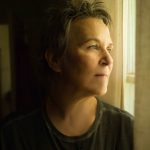A Conversation with Holly Williams
Holly Williams took a few minutes huddled in the corner of a hotel room with poor cell service to talk songwriting, the South, and her new record The Highway.
I grew up with my mom in Nashville. It was a musical household, but very different. My mom was classically trained, and grew up in the church singing. She said when she came to Nashville she wanted to be a singer, or a background singer. Every night we would sing around the piano downstairs. We were going to Amy Grant and Sandi Patty concerts. Those were my first memories of seeing music in an arena — my dad didn’t want us at his shows. He would say “I’m not Bocephus to you, I’m Daddy.” It was musical, but in a different way than most people think. We did not grow up around guitars or people dropping by. My time with my dad was much more about hunting and fishing than music.
Were you aware of your family’s musical history?
Definitely was aware at a very young age. My dad was so famous growing up that it overshadowed the Hank Sr. legend. My friends at school would see him on TV winning Grammys, selling out arenas — at one point he had nine albums in the Billboard top 50. He would tell me about Hank Senior, but I didn’t really understand. I thought he was this old guy who wrote songs and my dad was the famous one. I didn’t get that until a much older age. When you grow up like that, its normal. It doesn’t feel that different. He kept it very separate, and once a year he would show up at school and take us to the airport, then to the show with the police escort. When I was 18 I started playing guitar, and when I was 22, I went over to Europe with Ron Sexsmith. I didn’t know that Hank Senior was known anywhere outside the United States. They were freaking out. And my musical heroes – Bob Dylan, Tom Waits, Jackson Browne, Joni Mitchell were all calling my grandfather an influence.
What made you pick up the guitar?
Strictly the songs. I had all these melodies that had been floating around for about 10 years. I took a break from age 9 to 17 to be a kid — I wrote a ton of lyrics at age 8 and picked up a notebook that I had forgotten it. My mom had married a very famous songwriter named Johnny Christopher — he wrote “Always On My Mind” and all kinds of stuff. So he taught me three chords, I wrote a song, and sang it next week at the talent show. I didn’t know what a capo was, and I was in a different key than the track. It was a total nightmare. I’m still not an amazing guitar player likeBonnie Raitt can. The guitar and piano are strictly a way for me to find my way with the lyric.
Was your first song just something fun to do? Or was there some huge emotional moment at age 8?
More just listening to Debbie Gibson and wanting to do that. I was writing some strangely dark lyrics for a young girl who hadn’t suffered through any great tragedy. I don’t know where these words were coming from, because we were protected from most things. When my parents split up, I wrote a song for my mom and what she was going through. I have just always latched onto a real story song, with a true beginning and end and the journey in between. I love the Tom Waits songs that are like little movies in your head.
So you picked it back up at 18. How did that turn into a full time career?
The songs came first and I decided to pursue it. I didn’t know what was going on on Broadway downtown until I was in my twenties. I didn’t know anyone in the business. I called clubs all over Nashville, saying “I’m Hank Jr’s daughter, can I play? Any night!”. I did that for three years, playing little clubs. I opened for Ron Sexsmith and Billy Bob Thornton just from being seen. I was booking anything I could get. I was so focused on finding my own way, that I never thought to call my dad. I could have put a hat on and sang other people’s songs, but I wanted to build a fan base of my own. Nashville Scene put me on the cover, and I signed my first deal in 2003. I went to the Bluebird Cafe writers night, stood in line like everyone else, and played one or two songs. Once my dad saw my lyrics, he told me that he knew I was doing it for the right reasons.
So you signed with Universal South. What does that first record look like to you now?
It’s funny — they were perfectly times. Sometimes I still sing “I’ll Only Break Your Heart” or “Take Me Down”. On that record, I was just whispering, barely singing. Sometimes I let songs go — if it’s hard to relate to. I wrote “Man In The Making” when I was 18, and I still love it but it is hard to sing. It feels a little far off.
Do you write a lot of songs?
No. Very few. I can’t exaggerate enough. When I was first writing, I wrote all the time. Most of it was crap, and 15 percent of it I loved. I have never been the type to write a lot. That’s really where opening the store came in. I had a car wreck with my sister, she was really bad off, and I had to cancel a lot of tours. I opened the store, and found this rhythm of opening the store, folding jeans, closing the store, purchase orders, employees, and then coming out and getting creative. That’s the schedule I am on right now. I haven’t written anything since November, but I am trying to take more specific times off for it. Next time I’ll go to the cabin for a week and focus. I wrote 16 for this record, and had the whole thing done. It was calledRailroads and had it mastered and everything. Then I wrote “The Highway” and “Let You Go” in a few days. They come to me a lot when I am on the road, driving at night, away from everything. They are few and far between, but when I write them, I usually end up keeping them.
Are you listening to music constantly? Can you do both at the same time?
It’s hard for me to do both. It’s easy to write something you are stoked about, then you realize it is a John Prine song from 20 years ago. This happens to me all the time. Last year I was working on the record for 9 months and I barely listened to anything. I was so unbelievably busy on a daily basis, buying a house, recording, running the store. If I was listening, it was the classics. Maybe an old Nick Drake orMerle Haggard record. I wasn’t looking for new music. I’m excited to hit the road and listen more. I listened to that last Bon Iver record a bunch — it’s super soothing, doesn’t make me think to much, and was a nice end of day music.
Your first record was very stripped down, while the second had a more full band sound. It seems like you have developed your own sound with this new record.
Absolutely. I feel like this is my sound. A lot of that came from doing this theater tour with John Hiatt after the last record. People wanted to hear the broken down stuff I was doing with my husband. I just wanted to get back to a purer sound. I was on a major label for the last one, and there were a lot of opinions on that one, trying to make it fit country radio. It was a very intentional effort on this record to make my own sound. There’s a song like “Let You Go”, which is sort of a stomper where I get to play tambourine, to “Without You” and “A Good Man” where I get to go to the piano, and then I have story songs like “Waiting on June”. It feels like the first time I can deliver a show with all the aspects of what I am doing as a songwriter. It’s not like I have a record that I have to say “this normally has drums, but I’m playing it acoustic.” It took me a while to figure out the sound. We have this upright bass player singing these great three-part harmonies with my husband and I, and it all just works right now. From now on I will always hopefully have the freedom to make records this way, just calling in friends and seeing what works for the song.
Is your writing process different every time?
Usually not. I’m not the writer that sits down at the end of the day and puts pen to paper. They come out of nowhere, I call them little droplets from God. I was pumping gas and started singing the chorus to “The Highway“. I was washing dishes when “Drinkin’” came. The melody usually comes out with the lyric. I don’t think I have ever written a lyric without the melody. There are sometimes that I will sit down with the guitar and see what’s there, but usually I have something to build on.
Listening to this record, it’s the most southern-sounding thing you have done. You have this southern musical tradition. Is that something you identify with.
It’s funny, people are saying this is southern gothic, or this is old south feeling. I adore the South as much as I adore my favorite sushi place in L.A., but there is something there, from Louisiana to Tennessee. I love the simplicity of driving twenty minutes and be out in the rolling hills. The South is so rich with stories and rich history. I love the small towns — ones that haven’t been covered in a magazine that I just get to wander and discover. The stories of the south — whether it’sFaulkner or some local who wrote a memoir, they are so close to me. I go to Louisiana once a year and just sit on the couch and eat food with my family. It feels like you are so far away from the media and politics and everything else. There’s just a sense of comfort that I don’t get anywhere else.
Read more from The Song Survives:
A Conversation with Sean McConnell
Brandy Clark – “Pray to Jesus”
A Conversation with Thad Cockrell




